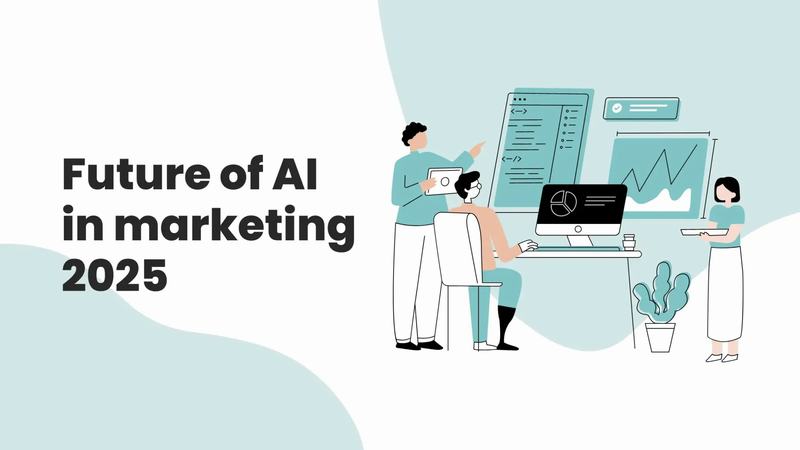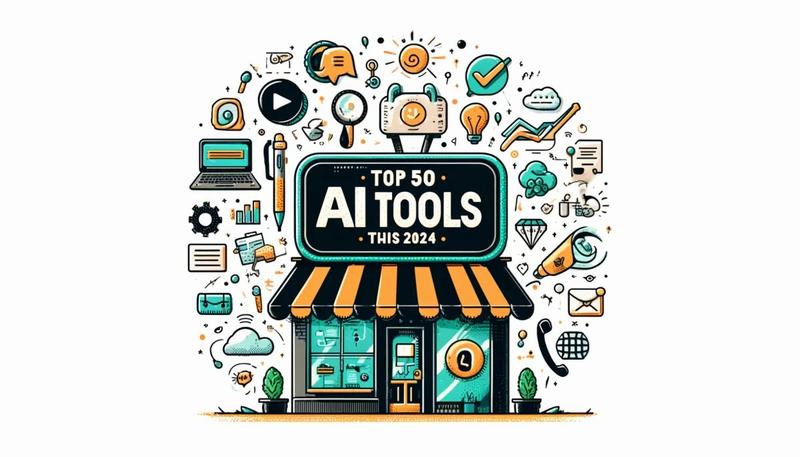Explore the future of AI marketing in 2025 with predictions on automation, personalization, decision-making, emerging technologies, and ethical challenges.
By 2025, AI is expected to transform the marketing industry through advances in automation, personalization, and decision-making. This transformation promises to streamline operations, enhance customer experiences, and drive strategic insights, making AI an indispensable tool for marketers.
However, this technological shift also brings with it important ethical considerations and workforce implications that businesses must address.
In this article, we’ll dive into AI marketing predictions for 2025 and beyond. We’ll explore how AI will automate routine tasks, enhance personalization, and improve decision-making. Additionally, we’ll discuss emerging AI technologies and how to address the ethical challenges and workforce impacts that come with AI integration.

The Future of AI in Marketing 2025.
AI Marketing Predictions for 2025 and Beyond
As we head towards 2025, the AI landscape in marketing will change dramatically, thanks to advances in automation, personalization, and decision making.
1. Increased AI Automation
One major trend is the increasing use of AI to automate routine tasks. By 2025, it is predicted that AI chatbots will manage up to 85% of customer interactions without human intervention, improving efficiency and customer service by providing quick and accurate responses to frequently asked questions.
We can see companies like Photobucket uses Zendesk bot to handle FAQs and streamline customer interactions, significantly improving response times by 14% and customer satisfaction rates by 3%.
2. Personalization will reach new heights
Personalization will also reach new heights. AI will enable more tailored marketing campaigns by analyzing customer behavior and preferences. This will allow businesses to deliver highly personalized experiences, from product recommendations to targeted Advertising, significantly boosting customer engagement and satisfaction.
Several tools have taken AI personalization to the next level. For example, Jasper.ai has become a comprehensive marketing tool that supports multiple stages of content creation, including personalized content creation.
3. Decision making will involve AI even more
Additionally, the role of AI in decision-making processes will become more prominent. By 2025, AI-powered tools will become an integral part of business strategies, helping leaders make data-driven decisions with greater accuracy. These tools will optimize many aspects of operations, from financial forecasting to supply chain management, thereby reducing costs and improving efficiency.
Leveraging AI for business intelligence, ClickUp AI helps teams visualize and interpret data to make informed decisions. The platform supports data visualization, predictive analytics, and automated reporting, making it easy for businesses to gain actionable insights from their data.
4. Ethical and regulatory considerations for AI will become more important
Furthermore, as the impact of AI increases, ethical and governance considerations will become more important. Companies will need to establish clear ethical policies and guidelines to ensure responsible use of AI, protect consumer rights and data privacy. This may involve establishing AI ethics committees and adhering to stricter regulations.
According to World Economic Forum legislative interest in AI is growing significantly. In 2022, legislatures in 127 countries passed AI-related laws, up from just one country in 2016. This shows a growing trend of ethical and governance considerations related to AI.
5. AI integration will significantly impact the workforce
Ultimately, the integration of AI will have a significant impact on the workforce. While AI will automate many routine tasks, it will also create new opportunities, especially in roles that require strategic and Creative thinking. Businesses will need to invest in training programs to equip their employees with the AI-related skills needed to remain competitive in this changing landscape.
According to McKinsey, by 2030, 30% of today’s working hours could be automated due to advances in AI dramatically changing the nature of many jobs. However, this automation is expected to create about 97 million new jobs globally, which could offset the 400 million jobs likely to be affected by AI .
Emerging AI Technologies in Marketing

Emerging AI Technologies in Marketing
The future of AI in marketing promises to bring advances that will transform the way businesses connect with their target audiences. From predictive insights to immersive augmented reality experiences, these emerging technologies are set to redefine the marketing landscape.
1. AI-powered predictive customer insights
Emerging AI technologies in predictive customer insights will transform the way marketers understand and engage with their audiences. These advanced systems will go beyond traditional analytics, using deep learning algorithms to predict customers’ future needs, preferences, and behaviors with unprecedented accuracy.
This shift will enable hyper-targeted marketing strategies and personalized customer experiences. Companies Investing in these technologies, such as Salesforce and Adobe, are leading the way in integrating more sophisticated AI models into their marketing platforms.
2. Artificial Intelligence for Content Creation
Generative artificial intelligence (AI), a rapidly growing field, is expected to revolutionize content creation in marketing by 2025. Tools powered by advanced neural networks, such as OpenAI’s GPT-4 and others, will generate engaging and relevant content in a variety of formats, including text, images, and videos.
These AI systems will be able to understand brand tone and audience preferences to create content that resonates deeply with target markets, significantly reducing the time and costs associated with traditional content production.
3. AI-Enhanced Programmatic Advertising

Programmatic advertising will see significant advancements through the use of AI. Emerging AI technologies will bring greater precision and efficiency to ad buying, enabling real-time bidding and audience targeting at unprecedented scale.
These systems analyze large amounts of data to dynamically optimize ad placement and creative elements, ensuring maximum engagement and ROI. Startups and large tech companies like Google and The Trade Desk are leading the way in developing AI-powered programmatic advertising solutions.
4. AI-powered sentiment analysis
Sentiment analysis technology is evolving rapidly, with new AI models becoming more capable of understanding and interpreting human emotions. By 2025, marketers will leverage these advances to gain deeper insights into customer sentiment across multiple channels, including Social Media, reviews, and customer service interactions.
This will allow brands to proactively respond to customer feedback and tailor their messaging to improve customer satisfaction and loyalty. Companies like Clarabridge and Brandwatch are leading the way in this area, developing more nuanced and contextually aware sentiment analysis tools.
5. AI-powered hyper-personalization

Hyper-personalization, fueled by emerging AI technologies, will take personalized marketing to the next level. These AI systems will integrate data from multiple touchpoints to create highly personalized marketing messages and offers in real time.
The ability to deliver contextually relevant content and experiences will increase customer engagement and conversion rates. Innovations in AI from companies like Dynamic Yield and Persado are pushing the boundaries of what’s possible in personalized marketing.
6. AI-Integrated Augmented Reality (AR)
The integration of AI with augmented reality (AR) is another emerging trend that will have a significant impact on marketing. AI-enhanced AR experiences will provide customers with interactive and immersive ways to interact with products and brands.
By 2025, we can expect AI to improve the personalization and adaptability of AR content, providing real-time customization based on user preferences and behavior. Tech innovators like Snap Inc. and Shopify are already exploring the potential of combining AI and AR to create engaging marketing experiences.
Ethical Considerations in AI Marketing
An important ethical consideration in AI marketing is data privacy. Because AI systems rely heavily on large amounts of consumer data to personalize marketing efforts, there are growing concerns about how this data is collected, stored, and used. Companies must ensure they are transparent about their data practices and comply with regulations like GDPR. (General Data Protection Regulation) to protect consumer privacy. Violations of data privacy can lead to loss of consumer trust and serious legal consequences.
Source: contentgrip.com
Comment Policy: We truly value your comments and appreciate the time you take to share your thoughts and feedback with us.
Note: Comments that are identified as spam or purely promotional will be removed.
To enhance your commenting experience, consider creating a Gravatar account. By adding an avatar and using the same e-mail here, your comments will feature a unique and recognizable avatar, making it easier for other members to identify you.
Please use a valid e-mail address so you can receive notifications when your comments receive replies.